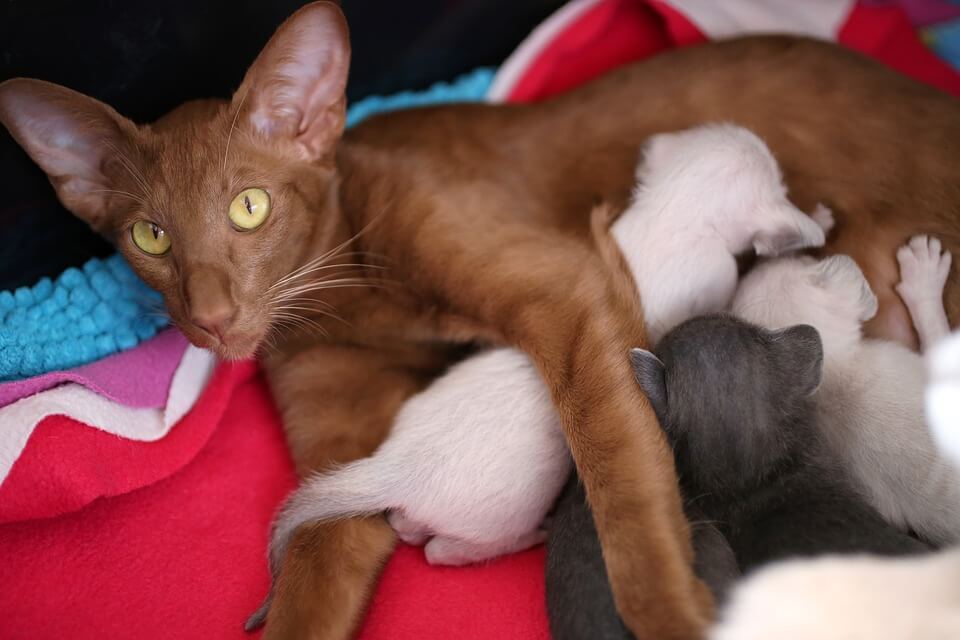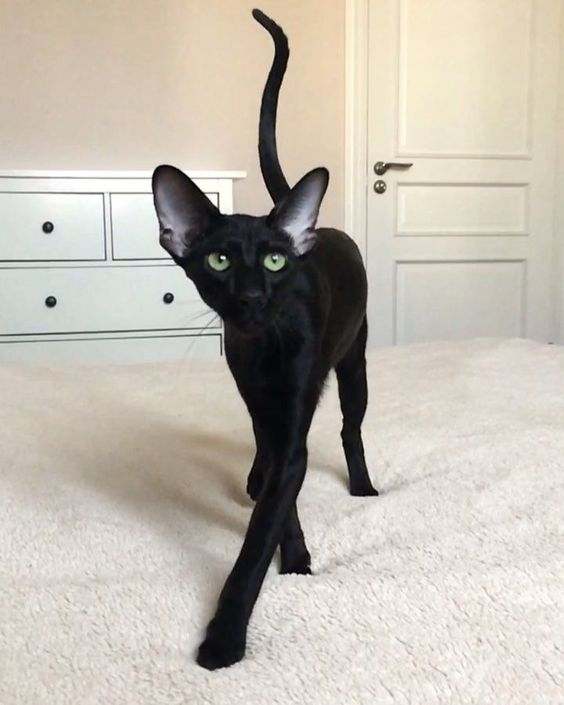The Oriental Shorthair is a nicely muscled medium-sized cat that has a long tail, neck, and body.
This cat can be thought of as a cat of extremes. For starters, it has a long and triangular head with a straight and long nose. Its long tail tapers at a point and the eyes are bright green and almond-shaped.
But perhaps the most interesting trait is their chatty and friendly nature.
Of all the shorthair breeds, the Oriental Shorthair has the most outgoing personality. They are very people-oriented and love to be around their human companions.
This cat will typically follow you around the house and will make their presence known through their excessive talking.
In this post, we will investigate the question of honking to establish if Oriental Shorthairs honk. Let’s jump right in!
Do Oriental Shorthair Cats Honk?
Well, it depends on what you understand by a honk.
If you are thinking of the honk you get from your geese or wild ducks, then the answer would be no.
That said, Orientals have a unique charming meow that can be described as a muffled honk.
Some Oriental Shorthair cats are very vocal, while others are more reserved.
However, all Orientals love to express themselves through meowing and plaintive cries.
Many also enjoy chattering away when they see birds or other animals outside.
While some people may find this annoying, it’s actually quite endearing.
Why Do Oriental Shorthairs Honk?

There are several plausible reasons why your oriental shorthair may be honking.
Here are some of the possible explanations.
1. They honk when they need something
One of the reasons your cat may be meowing is because they want something from you.
If they’re hungry, they’ll probably cry or meow until you feed them.
If they’re thirsty, they may cry or meow until you walk over to their water bowl and refill it.
If they want to go outside, they may meow at the door until you let them out.
2. They honk when they’re happy
Oriental Shorthairs also vocalize when they’re feeling happy or content.
Many cat owners report that their Orientals will purr or trill when being petted or held.
This is a sign that your cat feels safe and comfortable with you and enjoys your company.
3. They honk when they’re unhappy or in pain
Oriental Shorthairs may also cry or meow when they’re feeling upset or in pain.
If your cat is meowing more than usual, it’s important to take them to the vet to rule out any medical conditions that may be causing them distress.
4. They honk when they want your attention
Some Oriental Shorthairs simply enjoy human company and will meow or trill to get your attention.
If you find that your cat is constantly following you around and calling for your attention, it’s a good idea to set aside some time each day to give them the love and affection they crave.
This will help keep them happy and prevent them from becoming bored or restless.
5. They honk when they’re bored
If your Oriental Shorthair isn’t getting enough mental stimulation, they may start meowing or crying out of boredom.
To keep your cat happy and engaged, make sure you provide them with plenty of toys and playtime.
You can also try training them to do simple tricks or behaviors to help keep their mind active.
As you can see, there are a variety of reasons why Oriental Shorthairs may honk.
If your cat is being excessively vocal, it’s important to take them to the vet to rule out any medical conditions that could be causing the problem.
If no underlying health issues are found, then you’ll need to work on providing your cat with the love, attention, and stimulation they need to stay happy and healthy.
Parting Thoughts
If you have never been a parent to an oriental shorthair, you might easily be thrown aback by the revelation that this cat honks.
But before you back off, the honking is not the kind of loud noise you hear from geese.
On the contrary, it is a soft and polite honk that is nothing short of adorable.
So, if you are looking for a chatty cat, you won’t do better than the oriental shorthair.

Hi! I am Eleanor Price. I started this website after my cat, Louie, almost died from a case of botulism (a type of food poisoning often caused by bacteria that grow on food items). Turned out that my cat’s diet was the problem. I have made it my duty to provide the best information and recommendations about everything cat lovers need to know about their felines’ health and wellbeing. My goal is to find the most informative content on anything feline-related and share it with fellow hardworking kitty lovers.

